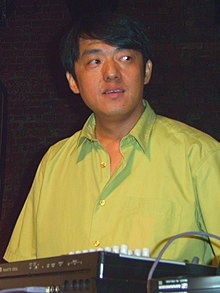

This biography of a living person needs additional citations for verification. Please help by adding reliable sources. Contentious material about living persons that is unsourced or poorly sourced must be removed immediately from the article and its talk page, especially if potentially libelous.
Find sources: "Lim Giong" – news · newspapers · books · scholar · JSTOR (February 2022) (Learn how and when to remove this message) |
Lim Giong
| |
|---|---|
 | |
| Born | Lim Chee Hong (林志峰) (1964-06-07) 7 June 1964 (age 60)
Changhua, Taiwan
|
| Occupation(s) | Musician, DJ, music producer |
| Years active | 1990–present |
| Musical career | |
| Also known as | Lin Chiang |
|
Musical artist
| |
Lim Giong (Chinese: 林強; pinyin: Lín Qiáng; Pe̍h-ōe-jī: Lîm Kiông; born 7 June 1964) is a Taiwanese musician, DJ, actor, and an active figure in the Taiwanese experimental electronic music scene. He is known for recording rock songs in Taiwanese Hokkien, starting with his first hit song "Marching Forward" in 1990. He is also known as writing film scores for directors such as Hou Hsiao-hsien, Jia Zhangke, and Bi Gan. His has received numerous awards for his work, including the Cannes Soundtrack Award in 2015 for The Assassin.
Lim was born in Changhua, later moving to Taichung where his parent ran a small food stall. He was educated in public schools and can speak Mandarin fluently, but he chose to sing in the local dialect Taiwanese Hokkien. After he finished his service in the army in 1988, he went to Taipei with the intention of pursuing a music career, and spent the next two years working in restaurants and beer halls.[1]
Lim Giong's music career began in 1990 when he was signed by a record company, and his first album, Marching Forward (向前走) was released in December 1990. The album proved highly successful, selling over 400,000 copies.[1] In his early albums Lim sang exclusively in Taiwanese Hokkien, and his music showed influences from American and British disco-pop, rock, metal, rap as well as Bob Dylan.[1] His songs ranged from love songs to observations of day-to-day reality of life in contemporary Taiwan including schools, military service and traffic. The title song from his first album, which describes his excitement upon his arrival in Taipei, became highly popular, including being used as campaign songs by political parties.[1] It was chosen as the Song of the Year at the 3rd Golden Melody Awards.[2]
His second album. Brother of Spring, was released in early 1992. It chronicles his struggles before he became famous.[1] This year he also started his acting career and association with the films of Hou Hsiao-hsien, first appearing in a cameo in Dust of Angels. He was associated with the genre known as New Taiwanese Song and gave rousing performances of folk-pop songs, such as "A Soundless Place" from the soundtrack of Dust of Angels.
From his third album onwards (Entertainment World, recorded in England in 1993), his compositions, inspired by Taiwanese traditional music, became increasingly infused with electronic music and evolved from drum and bass, break beat, ambient and electronica towards more experimental and freestyle work. This trend continued with his next two albums: China Fun (2002) and Folk Paradise (2003).
Having studied acting and after appearing in films as an actor, he became the favorite composer of Hou Hsiao-hsien, for whom he wrote the music of Goodbye South, Goodbye and Millennium Mambo. From these experiences, he developed an original perspective in the interaction between sound and image in a form called "Stereo Picture" (立體音畫, sometimes translated as "Three Dimensional Sound Picture"). His album Insects Awaken was released in 2005 in Europe on a French label (MK2.) and, a few months later, in Taiwan on the Taiwanese label EWise Digital Multimedia Corp. He was invited to perform music from this album for an outdoor event at the 2005 Cannes Film Festival, with images of the National Palace Museum's collection. This album won the award of Best Crossover Album at the 17th Golden Melody Awards in 2006. He also produced the music for a special 90 seconds commercial film commissioned to celebrate the 80th anniversary of the National Palace Museum, in October 2005. This short film won the gold award at the American Association of Museums' 2006 Muse Award. He also participates in the activities of the Creative Commons in Taiwan.
Lim composed the music for The Assassin, which won the Cannes Soundtrack Award in 2015.[3]
In June 2018, Lim was invited to become a member of the Academy of Motion Picture Arts and Sciences.[4]
|
| |
|---|---|
|
| International |
|
|---|---|
| National |
|
| Artists |
|
| Other |
|